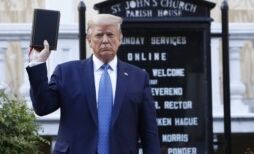正文
VOA慢速英语:退役将领与特朗普的冲突
American President Donald Trump has long talked about his support for the United States military. But comments this week show he might not have the full support of military leaders.
On Monday, Trump proposed using military troops to control and stop violent protests following the police killing of George Floyd, an African American man, in Minneapolis, Minnesota.
Trump said, "If a city or state refuses to take the actions that are necessary to defend the life and property of their residents, then I will deploy the United States military and quickly solve the problem for them."

As Trump was speaking from the White House, police officers and national guard troops began using chemical spray, smoke and sound bombs to remove peaceful protesters across the street at Lafayette Square.
After the area was cleared, Trump walked past lines of officers in riot gear on his way to St. John's Episcopal Church at Lafayette Square. Members of Trump's administration joined him, including the defense secretary and the military's chief of staff.
Trump stood in front of the religious building, which had been damaged during protests a day earlier. The president held a Christian holy book in one hand. Members of the media took pictures and videos of Trump and others with him.
Mariann Budde is the Episcopal bishop of Washington, D.C. She denounced the president's use of the bible and her church for the image. She said the image was against "the teachings of Jesus and everything that our church stands for." She said Trump's action supported "the use of tear gas by police officers in riot gear" to clear the area in front of the church.
Criticism from retired generals
Members of the U.S. military avoid making overtly political statements. Even former generals avoid criticizing a sitting president -- who serves as the commander-in-chief of the armed forces.
But on Tuesday, retired admiral Mike Mullen said: "The events of the past few weeks have made it impossible to remain silent." Mullen was the chairman of the Joint Chiefs of Staff under Presidents George W. Bush and Barack Obama.
Mullen wrote in the Atlantic: "It sickened me yesterday to see security personnel—including members of the National Guard—forcibly and violently clear a path through Lafayette Square to accommodate the president's visit outside St. John's Church."
The strongest and most public criticism came Wednesday from retired General James Mattis. He is Trump's former defense secretary. Mattis said in a statement: "When I joined the military, some 50 years ago, I swore an oath to support and defend the Constitution. Never did I dream that troops taking the same oath would be ordered...to violate the Constitutional rights of their fellow citizens—much less to provide a bizarre photo op for the elected commander-in-chief, with military leadership standing alongside."
Mattis added, "Donald Trump is the first president in my lifetime who does not try to unite the American people...Instead he tries to divide us."
The president answered the criticism from Mattis on Twitter. Trump called Mattis "the world's most overrated General." He added that he did not like Mattis' "‘leadership' style or much else about him, and many others agree, Glad he is gone!"
Mattis was Trump's first defense secretary. He resigned in 2018 after disagreeing with the president about pulling troops out of Syria.
Current military leadership
Current Defense Secretary Mark Esper and General Mark Milley, the chairman of the Joint Chiefs of Staff, have received criticism for joining Trump on the walk to the church on Monday.
Esper said he knew the group was going to St. John's. But he said, "I was not aware a photo op was happening." Esper also said he did not know that police had forcibly moved peaceful protesters in Lafayette Square to clear the way for Trump. The White House said the order to clear protesters came from Attorney General William Barr.
Esper also said this week that he opposed using American military troops to do the work of law enforcement. He said the Insurrection Act of 1807 should be invoked "only in the most urgent...of situations." He added, "We are not in one of those situations now."
Trump's press secretary, Kayleigh McEnany, said the president was still willing to deploy federal troops, even after Esper's comments. "If needed, he will use it," McEnany said Wednesday.
When asked if Trump still had trust in his defense secretary, McEnany said, "As of right now, Secretary Esper is still Secretary Esper, and should the president lose faith we will all learn about that in the future."
I'm Ashley Thompson.
Hai Do wrote this story for Learning English. Ashley Thompson was the editor.




 手机网站
手机网站